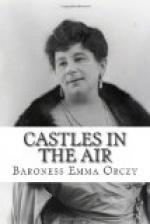Theodore’s attic, where he slept, was at the top of the house, whilst my room was on the ground floor, and so I felt that I could now go back quite comfortably to my office in the hope that more remunerative work and more lavish clients would come my way before nightfall.
4.
It was a little after five o’clock when I once more turned the key in the outer door of my rooms in the Rue Daunou.
Theodore did not seem in the least to resent having been locked in for two hours. I think he must have been asleep most of the time. Certainly I heard a good deal of shuffling when first I reached the landing outside the door; but when I actually walked into the apartment with an air of quiet unconcern Theodore was sprawling on the chair-bedstead, with eyes closed, a nose the colour of beetroot, and emitting sounds through his thin, cracked lips which I could not, Sir, describe graphically in your presence.
I took no notice of him, however, even though, as I walked past him, I saw that he opened one bleary eye and watched my every movement. I went straight into my private room and shut the door after me. And here, I assure you, my dear Sir, I literally fell into my favourite chair, overcome with emotion and excitement. Think what I had gone through! The events of the last few hours would have turned any brain less keen, less daring than that of Hector Ratichon. And here was I, alone at last, face to face with the future. What a future, my dear Sir! Fate was smiling on me at last. At last I was destined to reap a rich reward for all the skill, the energy, the devotion, which up to this hour I had placed at the service of my country and my King—or my Emperor, as the case might be—without thought of my own advantage. Here was I now in possession of a document—two documents—each one of which was worth at least a thousand francs to persons whom I could easily approach. One thousand francs! Was I dreaming? Five thousand would certainly be paid by the Government whose agent M. Charles Saurez admittedly was for one glance at that secret treaty which would be so prejudicial to their political interests; whilst M. de Marsan himself would gladly pay another five thousand for the satisfaction of placing the precious document intact before his powerful and irascible uncle.
Ten thousand francs! How few were possessed of such a sum in these days! How much could be done with it! I would not give up business altogether, of course, but with my new capital I would extend it and, there was a certain little house, close to Chantilly, a house with a few acres of kitchen garden and some fruit trees, the possession of which would render me happier than any king. . . . I would marry! Oh, yes! I would certainly marry—found a family. I was still young, my dear Sir, and passably good looking. In fact there was a certain young widow, comely and amiable, who lived not far from Passy, who had on more than one occasion given me to understand that I was more than passably good looking. I had always been susceptible where the fair sex was concerned, and now . . . oh, now! I could pick and choose! The comely widow had a small fortune of her own, and there were others! . . .




